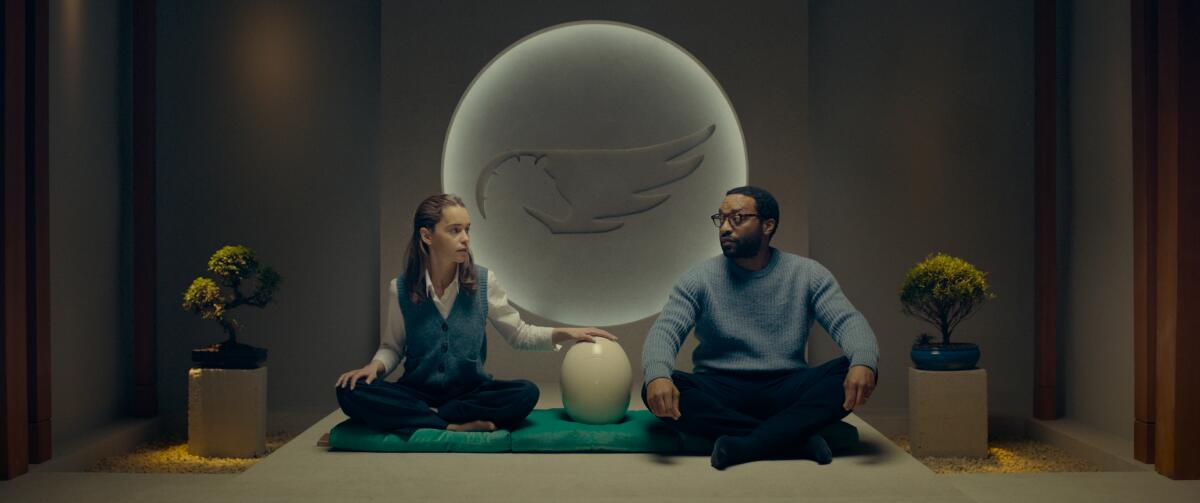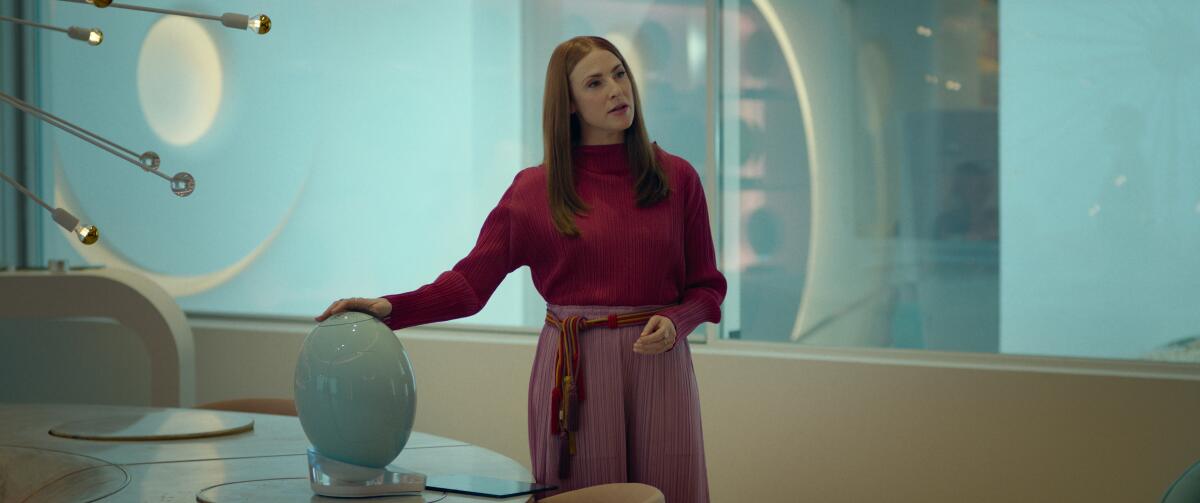Review: On the future of childbirth, ‘The Pod Generation’ plays it as safe as a helicopter parent

- Share via
It’s easy to agree with the premise of Sophie Barthes’ gleaming, quasi-dystopian “The Pod Generation”: With every technological advance, we’re leeching what’s natural from our lives, and letting the simulations take over. But the movie’s core — a marital seriocomedy in which Emilia Clarke and Chiwetel Ejiofor start a family in a brave new world — is as inert as an uncharged iPhone, taking most of the sting out of its cautionary satire.
In Barthes’ uneasy yet relatable vision of the big city’s near-future, smart homes wake people up with a perky virtual assistant (called Elena here) announcing the status of gut health and something called a “bliss index.” Citizens congregate at breathing stations, and therapy sessions are literally talking to a wall (a colorful screen offering up another AI voice).
Rachel (Clarke) is a high-powered corporate type working merrily toward furthering this world, introducing her team to their latest breakthrough: desktop machine-learners with big roving eyeballs she calls “cognitive executives.” The employees’ frozen smiles speak volumes, but Barthes has one vocalize it anyway: “Are we at risk of becoming redundant?”
Meanwhile, Rachel’s botanist husband Alvy (Ejiofor) isn’t so thrilled by this societal direction, which favors time spent in electronically controlled “nature pods” to actual trips to the country. Alvy’s students even seem put off by nature itself: One of them, in a genuinely funny moment, responds to the prospect of eating a just-plucked fig with a fearful, “But it’s from a tree, professor.”

Are we surprised, then, that Rachel and Alvy are at odds over how to have a baby? He wants a naturally birthed child, while Rachel (though her dreams suggest she’d like that too) signs up for what tech behemoth Pegazus’s wait-listed Womb Center offers: ex-utero gestation in a detachable, app-operated ovoid pod. “Solving childbirth” is the Center’s slogan, suggesting that gender roles, even in pregnancy, are the problem. Hovering over couples like Rachel and Alvy is the Womb Center’s director (Rosalie Craig), ready to soothe, facilitate and upsell, but also crisply disabuse anyone of non-contractual variations to the process.
Since Rachel and Alvy only ever feel like constructs, not characters, it’s predictable that their attitudes would reverse once their zygote is encased in egg-shaped plastic. Rachel begins to chafe at not feeling the fetus, a mood which leads to decreased productivity at work, while Alvy sparks to the worry and joy of looking after the gurgling pod. This shift should feel chunky and momentous, rich in the comic tension of a feminist ideal about equitable parenting hampered by a technology-fostered impasse. But in Barthes’ curiously distanced, muted handling, we only sense points being made, not lives being lived — as if we were peering into a visually sleek diorama (where Clement Price-Thomas’ production design impresses but the twee music-box score from Evgueni and Sacha Galperine irritates).
That serenely smug type of approach leaves our desire to care starved for nutrients. Clarke never solidifies the contradictions in Rachel — smart yet oblivious, ambitious yet timid — into anything dimensional, while Ejiofor, who fares better because of his natural charm, still looks like he’s coasting through a mouthpiece role. The irony is that Craig, positioned as mostly a comic figure, is the most intriguing presence, her brittlely rehearsed corporate jargon triggering some fun, if unintended, speculation: Is she real? Maybe an android?
Soulfulness versus slickness is of the worthiest subjects in our increasingly AI-dominated age, and it’s already led to some true modern classics, from “Her” to “After Yang.” It’s a dilemma that the thinly realized “The Pod Generation” regularly fails to address.
'The Pod Generation'
Rated: PG-13, for brief strong language, suggestive material and partial nudity
Running time: 1 hour, 49 minutes
Playing: In general release
More to Read
Only good movies
Get the Indie Focus newsletter, Mark Olsen's weekly guide to the world of cinema.
You may occasionally receive promotional content from the Los Angeles Times.










